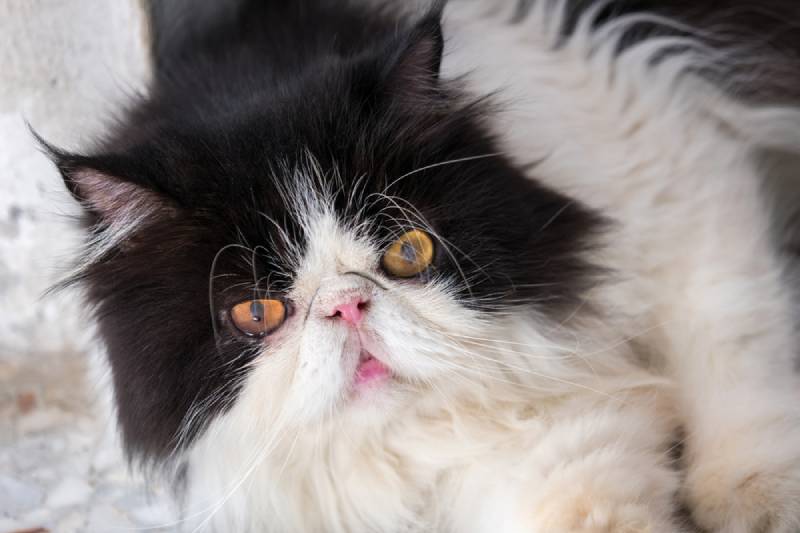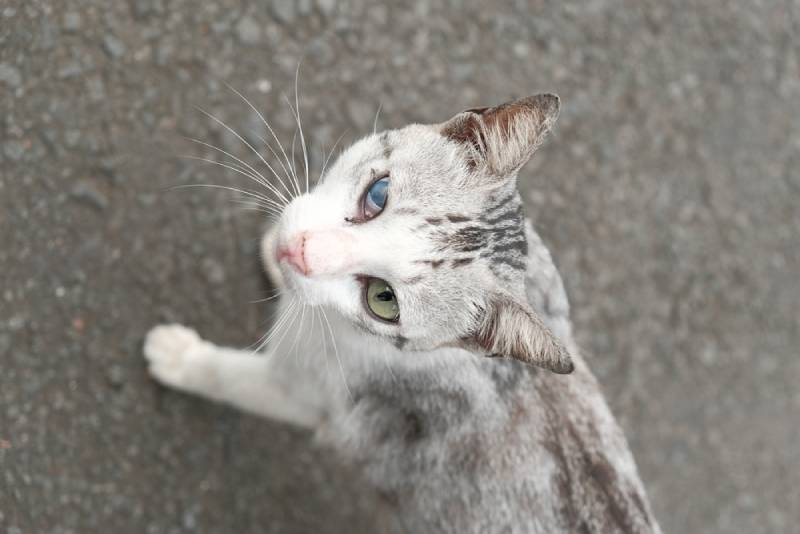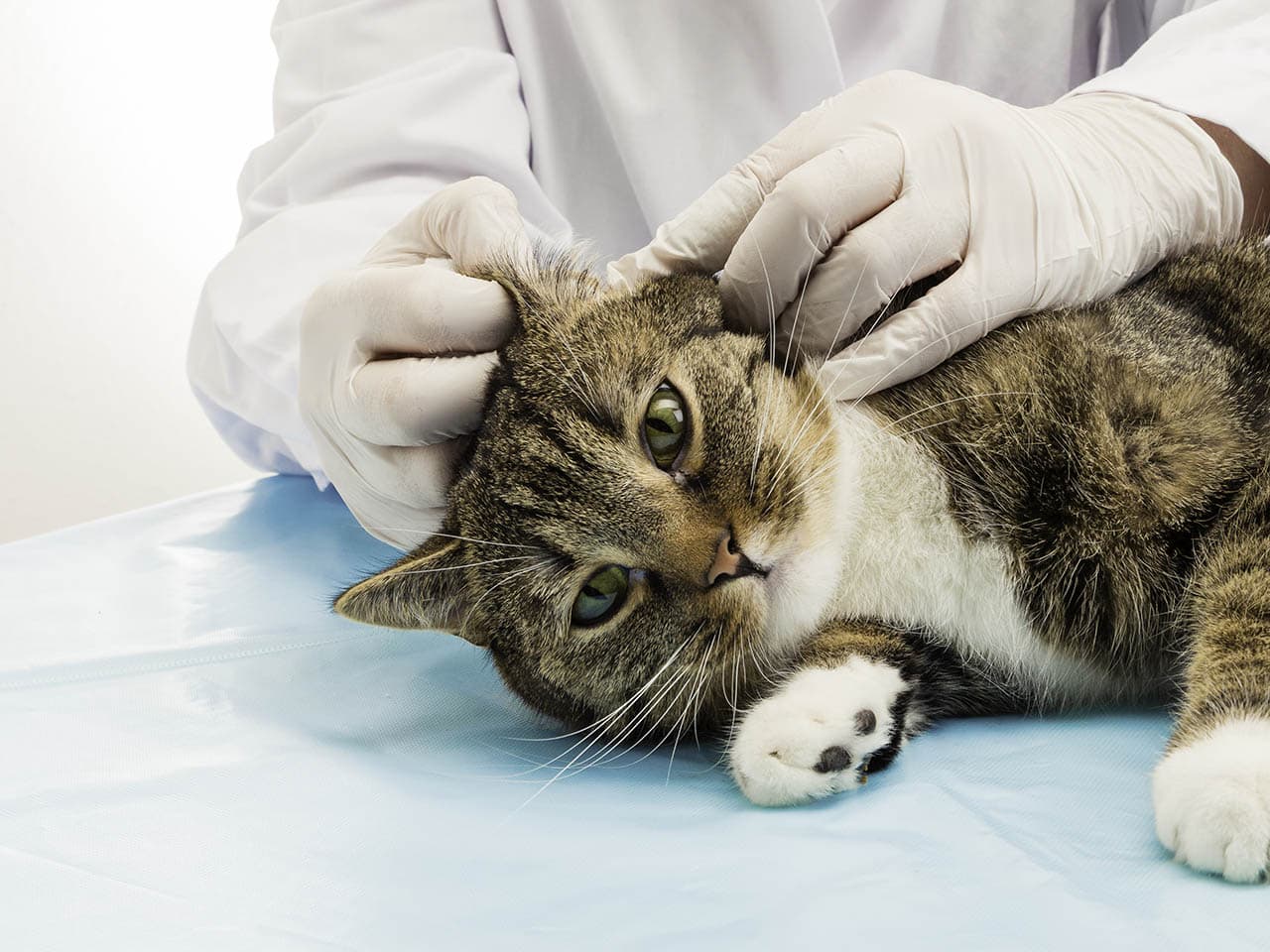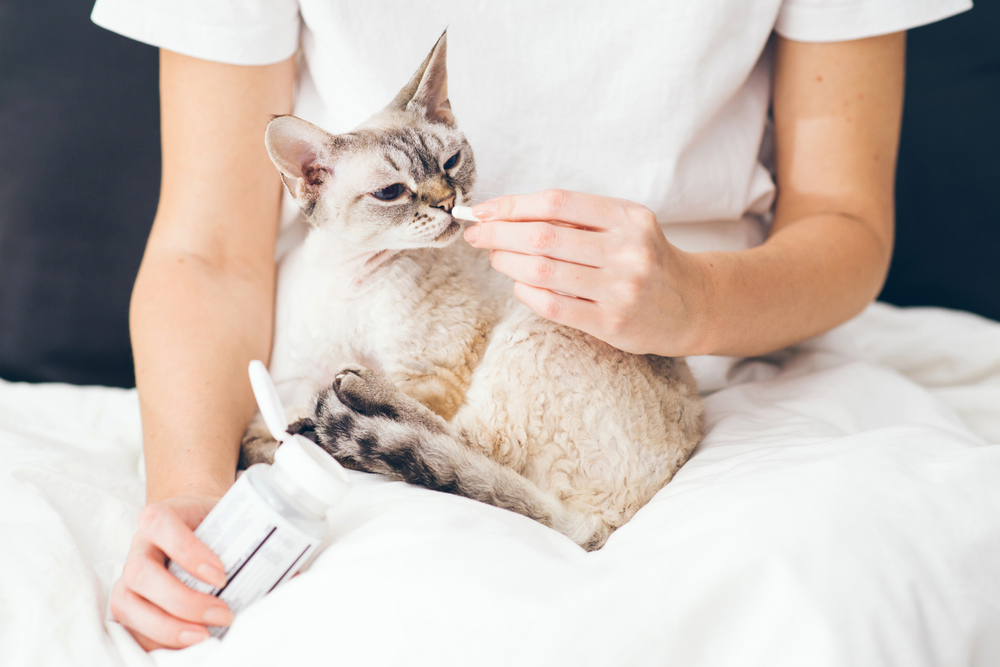If you notice your cat squinting or has a discolored spot on the surface of their eye, take them directly to their veterinarian. Keratitis is a condition that can affect your cat’s eyes and may have several different causes. Let’s examine this eye condition and see what your vet might do to diagnose and treat keratitis in cats.
What Is Keratitis in Cats?
Keratitis is a term that refers to inflammation of the cornea. The cornea is the transparent layer over the surface of your eye. If it becomes damaged or inflamed, the cornea can become opaque, so you can’t see through it.
There are three main categories for keratitis in cats, which are:
- Eosinophilic keratitis
- Non-ulcerative keratitis
- Ulcerative keratitis
The underlying cause for each of these types is keratitis tends to be a little different, and how you treat them varies. For example, ulcerative keratitis is often associated with trauma: something causes an ulcer or scratch to the surface of the eye.
Non-ulcerative keratitis occurs without a scratch on the corneal surface. Dry eye, which is less common in dogs than cats, is one potential case of this condition. Non-ulcerative keratitis can turn into ulcerative keratitis, mainly if left untreated.
Eosinophilic keratitis is a specific type of non-ulcerative keratitis. A specific type of white blood cell, an eosinophil, enters the cornea in large numbers.

What Are the Signs of Keratitis in Cats?
Cats can have keratitis affecting one eye or both eyes. You’ll usually see a change to the cornea’s surface or signs that something is bothering your cat’s eyes.
With inflammation, your cat’s cornea can become cloudy, which might be the first sign you notice. Sometimes, the area will look white. You might also see redness or blood vessels around the affected area.
Ulcerative keratitis is often associated with pain. Your cat might have blepharospasm or squinting of one or both eyes. They could also blink rapidly. Some cats will have excessive tears from their eyes, which could be clear or even mucus-like.
If your cat’s eyes are causing them discomfort, they might paw at or rub their eyes. Doing so can further traumatize the eye. If you see them do that, stop them and put on a plastic cone or Elizabethan collar while waiting to take them to the vet.
It might be more challenging to see, but you can also look and check if your cat’s pupils are constricted. If only one eye is affected, they might have only one pupil constricted.
Certain conditions, such as feline herpesvirus, are sometimes associated with keratitis in cats. This condition can cause signs of an upper respiratory infection in your cat. In addition to eye changes, things to look for include:
- Sneezing
- Eye or nasal discharge
- Lethargy
- Fever
- Anorexia
What Are the Causes of Keratitis in Cats?
Non-Ulcerative Keratitis
Eosinophilic Keratitis
A type of non-ulcerative keratitis, eosinophilic keratitis is most typically associated with feline herpesvirus. Unfortunately, this virus affects most cats, easily 80% or more. While this virus may not cause this eye condition, it has been linked in most cases.
Other Causes
Plenty of other conditions can cause non-ulcerative keratitis in cats. Dry eye, or keratoconjunctivitis sicca, is one such condition.
- Stromal keratitis
- Glaucoma
- Corneal sequestrum
Ulcerative Keratitis
The most common cause of ulcerative keratitis is trauma. Do you have an active, younger cat who likes to perform acrobatics across your living room? Or do you have a couple of kitties who want to fight with each other? These examples are just two of many that tend to develop corneal ulcers.
It’s important to note that brachycephalic or short-snouted cats, such as Persians, tend to be at a higher risk of developing traumatic injuries to their eyes. These kitties have eyes that tend to be more bulbous, and, in some cases, the eyelids don’t fully cover and protect their eyes.
Preventing Keratitis in Cats
Unfortunately, it isn’t easy to prevent keratitis in cats. If you have a need that might be predisposed to dry eye, talk to your veterinarian about steps you might need to take, such as lubricating eye drops. Watch your kitties to keep an eye out for injuries.
Keeping cats indoors is a great way to minimize their possible exposure to feline herpesvirus and reduce the likelihood of injury.
How Do I Care for a Cat With Keratitis?

The treatment for a kitty with keratitis depends on the underlying cause. Your vet will need to perform a thorough eye exam and will usually need to perform specific tests, such as:
- A Schirmer tear test to measure tear production
- Tonometry to measure eye pressure
- Fluorescein eye stain to check for ulcers
Depending on your veterinarian’s available tools, their comfort level with eye conditions, and your cat’s response to treatment, your veterinarian may refer you to a veterinary ophthalmologist. In cases of trauma or an ulcer on the corneal surface, your veterinarian will likely suggest an Elizabethan collar or cone to keep your cat from rubbing their eyes. They usually prescribe topical eye antibiotic drops or ointment to treat or prevent secondary bacterial infections. Pain medication such as Onsior or Meloxicam may also be prescribed to help minimize your cat’s discomfort.
You should also contact your veterinarian if medicating your cat’s eyes is stressing them out for possible anti-anxiety medication, such as gabapentin.
If there isn’t a scratch or ulcer, your veterinarian may try steroids or immunosuppressive eye medication to reduce and hopefully reverse some inflammation. It’s important to note that steroids are contraindicated if your cat has an ulcer, as they can make the ulcer worse. You should only use the drops you have at home after talking to your veterinarian first.
In severe cases, your veterinarian may recommend surgery. Some ulcers are so severe that the eye can perforate. There are also contact lenses for pets that can help protect the eye while it heals.
If your cat has feline herpesvirus, your veterinarian may recommend supplementing with lysine. It may reduce viral shedding in affected cats. Remember that this supplement isn’t a surefire treatment option, and the limited studies show that it may be less effective than initially thought.
Frequently Asked Questions (FAQ)
Will keratitis in cats go away?
In cases of ulcerative keratitis, the underlying trauma is often treatable. In cats with a conformational cause of their keratitis, the cause may not go away. Additionally, many cases of non-ulcerative keratitis need lifelong treatment or management for cats.
Can keratitis in cats cause blindness?
Yes, keratitis in cats can lead to blindness. Significant trauma to the corneal surface can lead to vision loss, but cats can also lose the ability to see through the usually clear cornea when it is infiltrated with fluid or white blood cells. Regions with a white or hazy appearance may indicate a blind spot in your cat’s vision.
Is keratitis in cats painful?
Keratitis can be a very painful condition in cats. The cornea has many nerves that innervate it, which means that this part of the eye can feel a lot. Think of the discomfort you feel if you get an eyelash in your eye: your cat’s eye can experience the same discomfort.
Conclusion
Keratitis in cats is a complex condition with many different causes and even more possible treatments. If you notice a discoloration to your cat’s cornea, squinting, or excessive tear production, contact your veterinarian as soon as possible to get your cat in for an exam.
Featured Image Credit by: Wirestock Creators, Shutterstock













